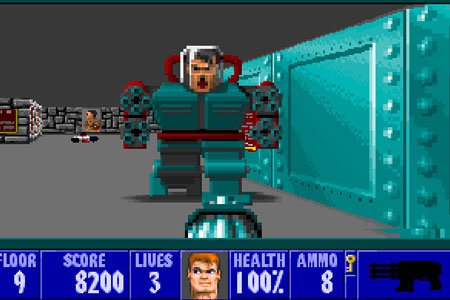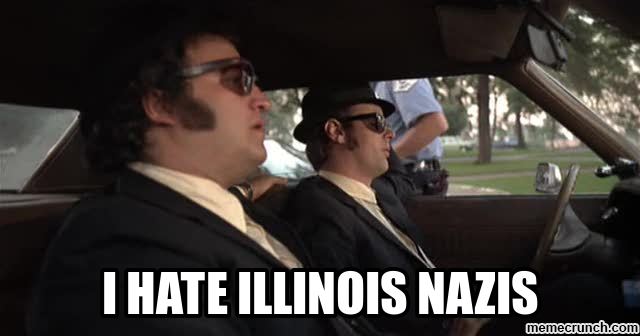A little bit of religious philosophy for your Monday.
Often, I come across the argument, advanced by theists (i.e. people who believe in one or more divine beings, usually in an American context we’re talking about Christians), that morality is somehow contingent upon the existence of God. Basically, if God doesn’t exist, then there’s no reason to be good–in fact, “good” and “evil” aren’t even real things!
Let’s give this some simple examination.
Theistic Moral Argument:
“God has to exist, because if God doesn’t exist, then we have no standard for morality! It’s all down to individual preference, and what’s to stop people from indulging their base impulses? If someone’s attracted to a child, why wouldn’t they act on those urges? What’s to stop people from murdering each other?”
The logical response:
So let me get this straight: are you saying that if you ever determined that God doesn’t exist, you would become a murdering, raping psychopath?
Because I wouldn’t.
And while that might not be what you’re saying, that’s what the above theistic moral argument entails: that without God, there is no standard of morality.
And that’s just not true.
It’s a logical fallacy called “begging the question” (i.e. assumes as a premise what it’s trying to prove). It assumes that God is the only source of morality in human experience.
And that’s a pretty empty way to look at the universe.
My morality doesn’t require the existence of a divine being to hand it down to me.
So where does non-religious morality come from?
Logic and reason are more than enough to figure out morality, and my morality starts with this:
Do no harm. Ask for consent. Respect others’ autonomy and basic humanity. Do good.
I think we can all agree that these are pretty standard moral principles. Does one really need them printed in a holy book?
How did the Greeks, for instance, establish morality? They’d never heard of the Christian God (predated its very conception, in fact), and their own concept of divinity was hardly morally perfect. They believed in deities that were great and powerful but also venal and fallible.
And yet they had concepts of justice and goodness vs. cowardice and evil.
And how are there good people in the world who don’t believe in God? Or people in the world who DO believe in God but still do evil things?
Thinking that a divine being must be the source of morality–or worse, a *particular* divine being–is a foolishly reductive argument. It’s also dangerous, because if you build no solid moral system for yourself, then when you have a crisis of faith (and we all do), then you will have no guiding principles.
Tying morality to religious doctrine is a recipe for societal ruin.
My Personal Context
And to clarify: I was raised in the United Methodist church and currently identify as a Christian agnostic.
Not because I’m not sure whether God exists, but because it’s ultimately not relevant.
One should live a good life, being good to others and doing right by humanity, whether God exists or not.
One shouldn’t do good things out of the hope of a reward (that’s a hollow, selfish reason to do good) or avoid doing evil things out of fear of punishment (that’s a hollow, selfish reason to avoid doing evil).
One should do good things and avoid doing evil things because it’s the right thing to do, because the world becomes a better place for all when we do good and avoid evil.
What if I’m wrong?
So what if I’m wrong, and there is indeed a god who disapproves of the way I live my life, and I end up condemned to some eternal torment?
Note that this god 1) refused to clarify exactly how to live in accordance with divine will, so as to avoid eternal torment (seriously, there are thousands of options out there—a loving god couldn’t have pointed out the right one, if it was that big a deal?), 2) continued to allow humans to live in constant fear and anxiety about existence, 3) throws people into hell because they didn’t do what they didn’t know to do.
I don’t know about you, but I’d define that god as an evil god—which is pretty far from any reasonable conception I might have—or at least as a vapid, ineffectual deity at best. A bad, alcoholic parent, who inflicts a radically elevated punishment for comparatively small slights you didn’t even realize were bad. Hardly a deity worthy of worship.
And, here’s the thing. I still lived a good life, doing good to people and to the world. If a god is going to condemn me for that—especially after not telling me the right way to do things—then there was no realistic way I could have avoided my fate. If I’m doomed anyway, then at least I did something good and useful with my life.
Cheers,
Erik
Further reading: https://en.wikipedia.org/wiki/Secular_morality










/cdn.vox-cdn.com/uploads/chorus_image/image/54957177/Far_Cry_5_Key_Art_Wide_1495770936.1495764208.jpg)



